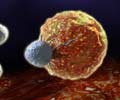Luciferase enzyme from deep sea creatures which imparts fluorescing ability used to track cell death in cancer therapy.
- Novel luciferase enzyme from marine dwellers allows to develop Matador assay which can track efficacy of cancer therapies.
- The florescence producing luciferases are released by dead and dying cells and can be measured quantitatively.
- The assay is highly sensitive, specific, rapid, and can be performed in a single step without the need for expensive equipment.
Testing cancer immunotherapies
While cancer immunotherapies including chimeric antigen receptor-T (CAR-T) cells are the most promising areas in cancer research, these are also the most difficult due to limited testing methods. Testing methods are critical to determine if the cancer therapy was successful in killing cancer cells. "Radioactive chromium release assay is the gold standard for testing whether an immunotherapy kills cancer cells. This method is expensive, complicated and requires special disposal practices," says co-author Preet M. Chaudhary, MD, PhD, professor of medicine at the Keck School.The hazards associated with the harmful effects of radioactivity and disposal of that radioactive waste prompt researchers to look for other safer alternatives for testing efficacy of cancer therapies.
Matador assay
The novel cytotoxicity assay involves expression of the luciferase enzyme in target cells. It is incorporated in such a manner that only healthy cells can retain the enzyme; dead or dying cells release the compound and as a result produce fluorescence. The released fluorescence can be measured using a luminometer and gives an idea of how many cells are getting killed and where."In our hands, the Matador assay can detect cell death in as little as 30 minutes, which can ultimately translate to more expedient treatments for patients getting cellular immunotherapies such as CAR-T cells," Chaudhary says.
"It could potentially play a role in screening other types of anticancer agents or even measuring environmental toxins."
To validate the ability to detect cytotoxicity, more than 80 cell lines were created that stably expressed luciferase in the cytosol. The study did not come across any cell line in which the Matador assay did not work as expected. In all the cell lines, there was significant increase in the luciferase activity upon induction of cell death.
Highlights of the assay:
- Highly sensitive, specific and fast
- Does not require expensive equipment
- Detects cell death at a single cell level
- Luciferase is highly thermostable
- Luciferases retain their activity even after thawing and freezing
- Matta, H. et al. Development and characterization of a novel luciferase based cytotoxicity assay. Scientific Reports 8, (2018).
















